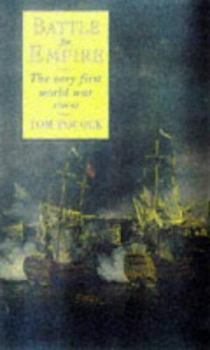Battle for Empire: The Very First World War, 1756-63
Select Format
Select Condition 
Book Overview
The true story of the first major global conflict...The first world war was not that which began in 1914, but the so-called Seven Years War which, in 1756, brought into being global conflict.The new... This description may be from another edition of this product.
Format:Hardcover
Language:English
ISBN:1854793322
ISBN13:9781854793324
Release Date:January 1998
Publisher:Michael O Mara Publications
Length:272 Pages
Weight:1.35 lbs.
Customer Reviews
3 ratings
"A Conquest Too Dearly Obtained"
Published by Thriftbooks.com User , 24 years ago
So wrote a British sailor, lamenting the Britons' huge losses at the Siege of Havana. Despite the cost, the British Armada took Cuba from the Spanish and proceeded to conquer the Phillippines too. By war's end, however, the Spanish weren't hit too hard, trading back these gems for relatively worthless properties such as Florida. The French, by contrast, lost not only Quebec but also trading bases in India - both for good. There are few events in history with as profound an effect on the modern map than the Seven Years' War, and Pocock (a descendant of one of its great sea admirals) makes a marvellous yarn out of it. There are some wonderful quotes, too, e.g. that of a young, sarcastic Royal American officer lambasting a stupid superior who missed a strategic opportunity...
An eminently readable history of the Seven Years War
Published by Thriftbooks.com User , 25 years ago
Tom Pocock, whose biographies of Nelson are also very much worth your time, has written a wonderful short history of the Seven Years War, which he is correct in referring to as the first truly world war, and as the war that set Britain on its road to empire. Pocock has a real talent for vividly depicting people in a chapter or two, including the unfortunate Admiral Byng (shot to "encourage the others" as Voltaire wryly observed), Wolfe, and Clive. Very, very much worth reading; the Seven Years War (which has been consistently reduced to the status of a minor squabble in American history books under the misnomer of the "French and Indian War") has been almost forgotten but its effect on the history of the late 18th and the 19th centuries cannot be overestimated.
British Global Strategy and Rapid Deployment 1756-63
Published by Thriftbooks.com User , 26 years ago
Tom Pocock correctly identifies the Seven Years War (1756-63) as "The First World War" and gives a very readable account of how Britain waged it outside Continental Europe. The focus is however purely on this aspect and, as such, the campaigns on the European Continent, including the spectacular role played by Prussia, are excluded. The sheer geographic scale and the vaunting ambition of British policies are however well conveyed as well as the brilliant strategies underlying the first war to be fought with truly global objectives. As well as the better-known campaigns such as "The French-Indian War" in North America, Clives's amazing conquests in India and Byng's disastrous manoeuvres off Minorca (that led to his execution by firing squad "to encourage the others"), there are fascinating accounts of less familiar undertakings such as the operations of the author's own kinsman in the Indian Ocean and the captures of Manila and Havana by British expeditionary forces. The Havana operation, which finally succeeded at a horrendous cost in deaths from disease as well as military action, is an epic that would merit a book in its own right. Though satisfying as far as it goes, once feels that the author missed an opportunity in "Battle for Empire" in not expanding the scope to cover the whole war, on all fronts. There is a gap in the market for a readable single-volume narrative history of the war, ideally written with the easy style, lively depiction of personalities and colourful anecdotes which Mr.Pocock provides in this one.






